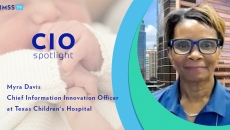Clinical
The goal of the new initiative is to explore ways to harness artificial intelligence and machine learning to "facilitate healing while improving equitable access to healthcare," says the college's president.
NTUH vice superintendent Dr I-Rue Lai explains current work to introduce a value-based care system, starting with a new scheme for chronic disease patients.
Also: Camden County and Penn’s School of Nursing is using virtual reality training to teach Narcan administration for local communities.
With the unique title of chief information innovation officer, Davis takes a forward-thinking approach to tech advancement. She discusses IT opportunities of standing up a new hospital, as well as provider and patient experience and AI initiatives.
It is the first Taiwanese hospital to be validated for both Stage 7 INFRAM and Stage 6 AMAM.
With more complete data at the point of care – including patient out-of-pocket drug cost options – Emory aims to assist patients with prescription affordability and improve their medication outcomes.
According to I-DAIR's Dr Ricardo Leite, we can reduce the burden of disease by focusing our limited workforce on things we can fix. Going digital makes this possible, so we can shift from "disease systems" to "health systems".
Also, Te Whatu Ora is consolidating the costing systems across New Zealand's South Island.
Dr. Michael Poku, chief clinical officer at Equality Health, talks tech needed to successfully tackle inequity, the benefits of investment in independent primary care physicians and how providers can work on the costs of health inequities.
The CIO, who is also an associate dean at Stanford University School of Medicine, discusses AI and innovation projects his team has been working on, where he’s prioritizing strategic IT investments, and some emerging technologies that have him intrigued.









